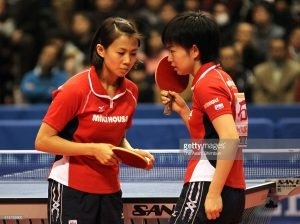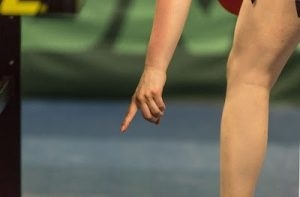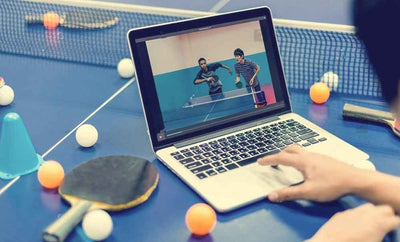
How to be Everyone’s Favorite Doubles Partner
Playing doubles in table tennis can be fun… or it can be hell on earth.
It all depends on the chemistry of you and your doubles partner, whether it’s a partner of the same sex, or mixed doubles. Take our short quiz to see what kind of doubles player you are:
Do you serve whatever you want without your partner knowing?
A. Yes! If my partner is strong, he should adapt to the opponent’s receive.
B. Sometimes, because I honestly forget that I’m playing doubles.
C. No, I always inform my partner first before I serve.
Do you disagree on which side of the coin to choose during the coin toss?
A. Yes! I’m very lucky, so I’m sure the coin will flip to heads, and then we’ll get to serve first. My partner should not interfere.
B. Sometimes, because I’m petty like that.
C. No, it doesn’t matter who chooses as long as my partner and I are on good terms.
Do you stay at the table when your partner goes to chase after a ball?
A. Yes! I’m always picking up the slack in the game, she can go pick up the ball by herself.
B. Sometimes, because I’m tired.
C. No, I don’t want to just stand there while my partner is going after the ball.
Do you talk in between points?
A.Yes! I list down everything my partner did wrong and make him listen to my winning strategies.
B. Sometimes, when I succeed in not being too annoyed by how she is throwing away points.
C. Yes! We strategize and motivate each other.
Do you stop talking to your doubles partner after you’ve lost a doubles match?
A.Yes! It’s his fault that we lost. I’m going to ask the coach to reassign me a new partner. A person of my caliber should be paired up with someone who is actually good.
B. Sometimes, because tempers flare up or I can’t help feeling disappointed in my partner and myself.
C. No, we still talk after we lose a match. Our friendship is more important than something that’s just a game.
Answers:
If most of your answers were A:
Ever wonder why your teammates shy away from you as you look for a doubles partner? Maybe it’s because you’re not the best type to play in a setup where the players coordinate and not compete. Playing doubles is about compromise and teamwork, your doubles partner is just as important as you are. If you’re not aware that you’ve been acting like this, maybe now is a good chance to show your teammates that you can be a good doubles partner. And if you don’t want to change your attitude, you can always play singles instead.
If most of your answers were B:
It’s okay, playing doubles definitely has a steep learning curve. Not only do you have to remember all these new, complex rules, but you also have to remember that you are not the only player out there on your side of the table. Just like in any of your relationships, though, it’s good to see yourself as the half of a whole, instead of insisting on your own way all the time.
(For those who got A’s or B’s, don’t despair yet! Read on below to learn how to be a good doubles partner.)
If most of your answers were C:
Congratulations! You’re a great doubles partner. You are able to compromise and embody the ever-elusive compassion in maintaining a good working relationship with your partner. You understand that this is not just about your individual skill as players, but how communication and working in tandem are the true keys to winning your doubles matches. And most importantly, that the friendship you have together is far too valuable to lose over something as insignificant as a game that you won’t remember the outcome of ten years from now.
In some cases, you already have good chemistry and team work with your doubles partner. But the problem is you’re not a strong enough player. In that case, we strongly recommend you get a good table tennis coach and good training environment to improve yourself first.
How to be a Good Doubles Partner
You’re here! Good job. Wanting to improve yourself is winning half the battle.

Source: The Asahi Shimbun | Getty Image
-
Communication. The right kind of communication.
No blaming your partner. No criticism that isn’t constructive. No calling names or berating your partner. It is never pleasant to be blamed or criticized, even less so if it’s being done to you when you’re already feeling bad or under pressure. Chances are, your partner isn’t trying to make you guys lose on purpose. Berating her will just drag down your chances of winning, and most probably damage your friendship.
Communication can happen anytime—in between points, while you’re warming up before a match, while you’re chasing after a ball, in between matches, or even just in the simple hand gestures you make to show what serve you’re going to execute.

Source: Table Tennis Photography British League
Communication extends to when you’re off the court. It’s not just about talking strategy and tactics, it’s also about getting to know each other. Do you know what your partner wants when the two of you are losing? Does he want you to stay quiet or encourage him? What about if the shot goes right? Does he prefer an enthusiastic high-five or a silent “Good job?” Be honest and open. Think of it not as building a working relationship or a temporary partnership that lasts for the duration of the game, but ultimately, a bond of friendship.
-
Compromise and strategize.
You know that by executing your winning serve, there is a 50/50 chance of your opponent not being able to receive it. But you also know that your partner will not be able to return the receive. Compromising is not about “lowering yourself to your partner’s level.” Compromise is about compassion, about making the most out of your abilities—including your strengths and weaknesses—as a pair.
-
Don’t act like the coach.
There are limits to this, of course. It is always a good thing to help out your partner when you see her struggling with a specific aspect, or if she asks for your help. However, if you see her getting annoyed with your little side-comments, it’s best to keep them to yourself. This works better if you offer points of improvement as suggestions, and not as commands. You are not her coach.

Source: Petrissa Solja | Getty Images
-
Be open to suggestions.
This goes both ways. Your partner may sometimes be genuinely concerned or trying to help. He is not your coach, but he is your teammate and all he wants is for the two of you to win. If you think he is being bossy or if you’re annoyed by his suggestions, kindly refer back to the first point: communication. You can stand up for yourself without being unkind. Being passive-aggressive (read: ignoring your partner as he talks to you, turning away from your partner as he offers a suggestion) is never a good idea.
-
Be a cheerleader.
Not literally, of course! Because you are working as a team, your own mood can often affect your partner’. If you are pessimistic and act like you couldn’t care less about losing points, sooner or later your partner will either be fed up with you or begin to show signs of giving up too.
Likewise, try to put a positive spin on things if you sense your partner is having a hard time. Stay calm under pressure and I’m sure your partner will appreciate it. Sometimes, two players with great chemistry can triumph over two higher-level players with no teamwork.

Source: Olympics Day 8 – Table Tennis | Getty Images
-
Apologize and forgive.
Personally, it depends on you and your partner’s agreement, but I find it better to apologize for any points that I’ve lost for us. Of course, some people say that it’s better not to apologize, so as to say that the point lost was the fault of both players as part of their teamwork.
However, almost anyone will agree that, should your partner apologize to you: always forgive and forget. This is not just for the sake of your partnership, but your friendship as well. Carrying blame around will drag down both your spirits and energy, when you should be channeling a joint effort in winning against the opponent.
-
Be humble, share the credit.
Humility is a virtue and even if you did make the winning shot or if you scored most of the points, don’t brag about this. Because if you won, you won together. Never discount your partner or the equal efforts you put in making this win possible.

Source: World Championships 2015 – Table Tennis – Mens Doubles Results
-
Constantly work on yourself.
Just because your partner may not be blaming you for the consecutive failed returns, does not mean you can slack off. Just like in any singles match or training session—or life in general—you should constantly strive to improve on whatever it is you’re not on top of during this particular moment.
Looking into your faults provides the opportunity to improve yourself. Know you can always ask your partner for help—that’s teamwork. Playing your best, trying your hardest, these are not just what you owe your partner, coach, and other teammates, but what you owe yourself as a player.





Leave a comment